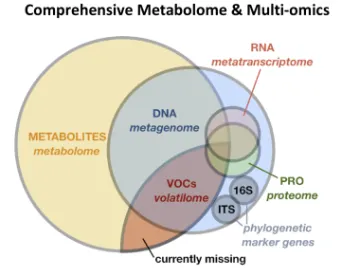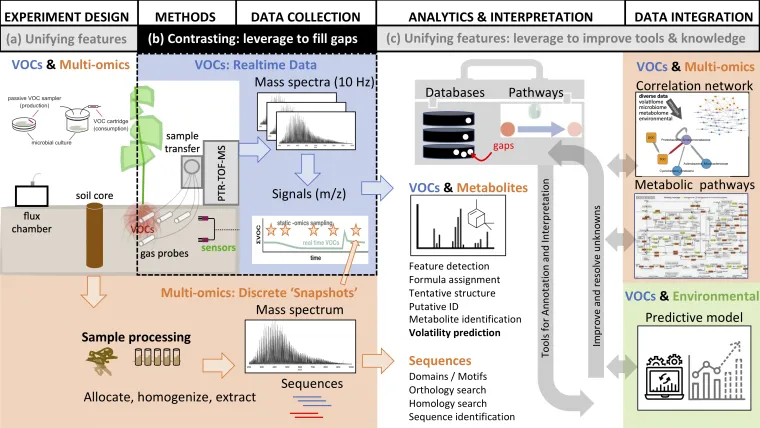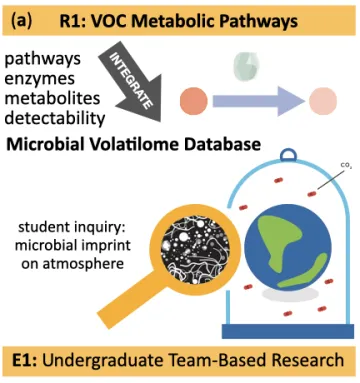Microbial Volatilome

Figure 2: The volatilome includes the full suite of microbial metabolites that are typically found in the gas phase. Traditional metabolomics do not capture these volatile gases. To understand the comprehensive metabolome, we must integrate traditional and volatilomics approaches. See Meredith and Tfaily (2022) for and updated figure and more information.
The goal of this VIP team is to generate new understanding of the role of volatile compounds in microbial metabolism. The team will develop a database and tools to increase understanding of the microbial volatilome (Fig. 3). For example, we evaluate measurements of soil-atmosphere VOC fluxes reflecting microbial VOC metabolism from the Biosphere 2 Tropical Rainforest Water, Atmosphere, and Life Dynamics campaign (Werner, Meredith, and Ladd, et al., 2021; Science News Articles 1 & 2) alongside gene content and expression data (Fig. 3b). In addition, we develop new automated pipelines to predict the volatility of organic compounds involved in soil microbial metabolic pathways of interest (Honeker et. al, 2021). We also collaborate with bioinformaticians to improve genomic pipelines to better identify potential VOC cycling genes in our data sets (Fig. 3a). We test hypotheses regarding whether particular microbes and their genes can produce or consume VOCs by testing microbial cultures in the lab (Fig. 3d). Finally, we collaborate with industry partners in the Boston area (Aerodyne Research and QuantAQ) to develop and use cutting-edge sensors and mass spectrometers to measure VOCs in soil (Fig. 4b), including through an industry internship program for undergraduate students (starting Summer 2023). In summary, this VIP team uses a multi-pronged approach to discovery on microbial VOC cycling in soil.
Figure 3: The Microbial Volatilome Team will compile information on microbial VOC pathways from a) existing, but currently disconnected, databases and literature reports. We will use new and existing data to test hypotheses, including b) shifts in pathway components (e.g., VOC fluxes, gene expression) with controlled drought and rewet in the B2 TRF; c) follow stable isotope labels into metabolites, VOCs and genes; and d) measure VOC production and consumption by microbes.

Figure 4: Unifying and contrasting features in volatilomics and multi-omics. This VIP will provide opportunities to be involved in diverse research approaches illustrated here. See Meredith and Tfaily (2022) for and updated figure and more information.
Expected outcomes of students enrolled in this VIP include:
- Learning and mastering different roles and skills through long-term interdisciplinary research;
- Effective preparation for post-undergraduate career stages;
- Meaningful mentorship.
Issues Involved or Addressed
- Which organisms and metabolic pathways drive belowground cycling of different volatile organic compounds (VOCs)?
- Are particular genes and their expression by microbes predictive of the rates of a given VOC metabolism?
- What biological and environmental factors control the impact of microbial soil VOC production and consumption that lead to net VOC exchange in ecosystems?
Methods and Tech
- Learning and mastering different roles and skills through long-term interdisciplinary research;
- Research Skills
- Critical evaluation of scientific literature
- Database mining and integration
- metabolic pathways (e.g., MetaCyc75, KEGG76);
- genes (e.g., IMG/M database77, National Center for Biotechnology Information; NCBI);
- metabolites (e.g., mVOC 2.043, Atlas of Biosynthetic gene Clusters90);
- metabolite volatility (SIMPOL85, SPARC87); and
- metabolite detectability (e.g., PTR Library86, NIST20 MSl Library).
- Organizing open and reproducible data
- Google sheets
- Excel
- GitHub
- CyVerse
- Computer programming and analysis pipelines
- R
- High performance computer (HPC)
- Kbase
- Hypothesis generation and testing
- Laboratory methods in microbiology and genomics
- Culturing microbial isolates
- Extracting DNA and RNA
- Testing VOC production and consumption by cultures
- Analyzing genomic data using bioinformatic pipelines
- Trace gas instrumentation and measurements
- Novel VOC sensors
- High resolution proton-transfer-reaction time-of-flight mass-spectrometry
- Custom sample transfer systems for measuring VOCs in soil and cultures
- Statistical analyses and interpretation
- Basic writing and editing
- Writing a scientific abstract
- Scientific writing
- Science Communication
- Oral Presentations
- Poster Presentations
- Research Skills
Academic Majors of Interest
Open to all majors, with interest in the sciences, including:
- Natural Resources
- Global Change Ecology and Management
- Hydrology and Atmospheric Science
- Environmental Science
- Biochemistry
- Molecular and Cellular Biology
- Chemistry
- Ecology and Evolutionary Biology
- Biology
- Plant Sciences
- Engineering
- Biosystems Engineering
- Computer Science
Preferred Interests and Preparation
Skills:
- Communication
- Critical thinking
- Familiarity with chemistry and biology terms
- Interest in earth, ecosystem and/or microbial systems
Attributes:
- Enthusiasm and personal drive
- Initiative
- Willingness to learn
- Attention to detail
- Ability to work collaboratively and independently
- Organized approach
- Punctuality
Application Process
To express interest in this team, please complete our Microbial Volatilome VIP Application.


